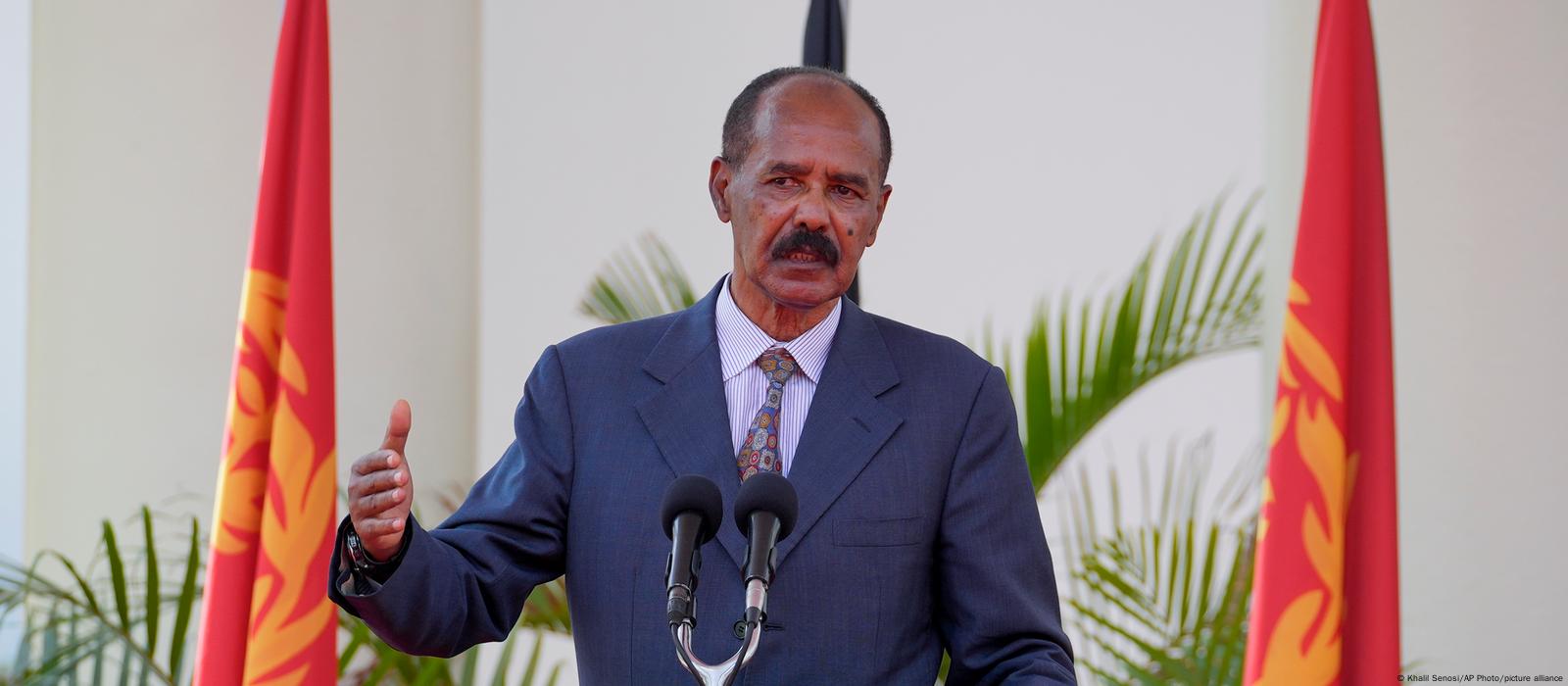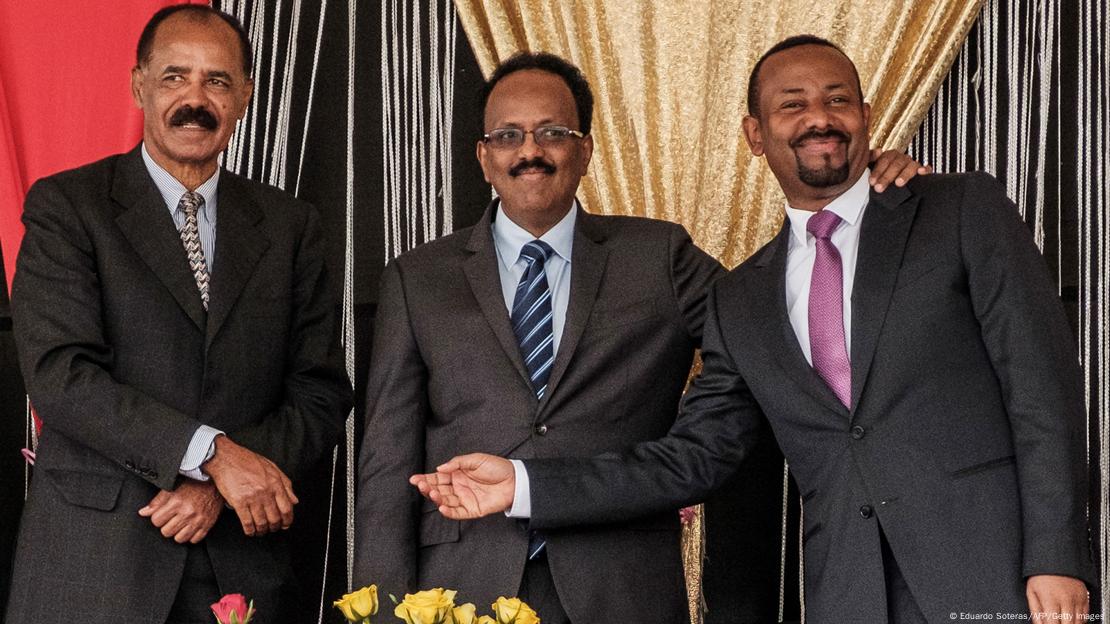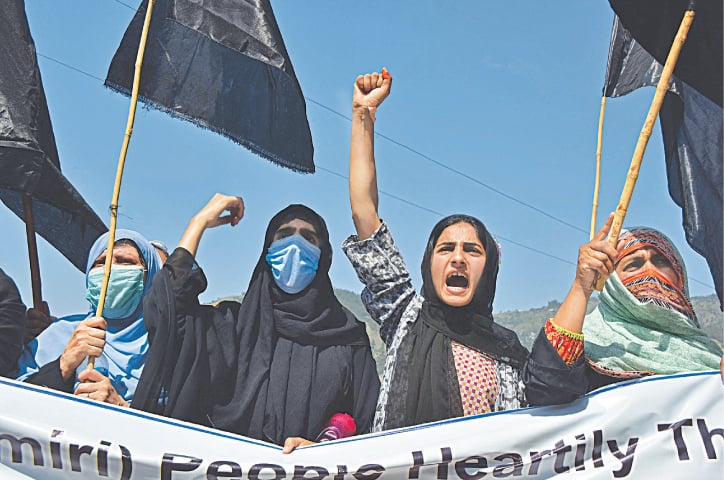ERITREA
Liberator to oppressor: 30 years under Isaias AfwerkiANOTHER SAD TALE OF STALINISM

Isaac Kaledzi
The turning of the tides
But just a few years later, in 1998, war broke out between Ethiopia and Eritrea over the small border village of Badme.
"That was the trigger. It was a dispute over a contested area of land, but underlying that were other tensions," Wrong told DW, stressing that the economy was only one of many such tensions.
The war over who got to control Badme only ended in 2018 with the signing of a joint statement at the Eritrea–Ethiopia summit. Ethiopia's prime minister, Abiy Ahmed, decided to end the war and restore peace after coming to power.
However, that 20-year war left tens of thousands of people dead, and many fleeing the country. During the two decads, Isaias Afwerki had also become a different leader compared to how he was viewed at during the beginning of his tenure.
African security analyst Fidel Amakye Owusu told DW that Afwerki had become firmly focused on consolidating power under his leadership. "So, his 30 years [in power] have been just for himself," Owusu highlighted.
"As in whether [this time has been] good or not, we see it in the human rights abuses: There are a lot of Eritrean dissidents or people who have fled Eritrea, not because of any internal conflict but because they are escaping authoritarianism and autocracy," he further explained.
Human rights: abuse upon abuse
Isaias created a system whereby there was no room for dissent, even severely penalizing ministers who stood up to him and criticized him.
"[The group if ministers] were known as the G-15. In fact, they were all arrested. The ones who were in Asmara were arrested. … They haven't been seen since. They've been in jail ever since. And we know that some of them have died," Wrong said, adding that ministers who had managed to escape abroad have never been able to go back to their home country.
Religious freedom has also been curtailed: Churches that were active in the country were forcibly closed overnight. As were universities, which were turned into military technical colleges.
"So, these were all areas where Isaias sort of felt uneasy because people might have stood up to him, challenged his power, his hold on the country," Wrong said.
"And more and more, you see power just focusing in his hands."
Africa's very own hermit kingdom
Analysts like Owusu say that under Isiais Afwerki's leadership, Eritrea has become the most reclusive state in Africa.
"If we are looking at Eritrea, you are looking at what North Korea means to the world. That's what Eritrea means to Africa. It is reclusive, secretive and isolated," Owusu told DW.
The strongest evidence of this can be found in the country's relationship with free speech: Press freedom under President Isaias has become non-existent, with countless media houses being closed and journalists getting arrested — to this day.
Last year, Eritrea took up the penultimate position on the RSF World Press Freedom index — one spot above North Korea.
The regime's repressive methods have also forced many young people to flee the country, driven above all by Eritrea's mandatory national service, which requires all graduates to join the army — for an unspecified period of time.
"Young people … realized that they have no future in Eritrea because of one of key policies that Afwerki has stood by for years, that is obligatory, open-ended military conscription," Wrong said.
"So if you're a young person, doesn't matter if you're a man or a woman, you are expected after you finish your education to go and start training and to learn how to be a soldier."
Analysts stress that this kind of conscription has had a terrible impact on a whole generation of young Eritreans, who feel increasingly disconnected from their country.
The regime meanwhile tries to justify this continued policy by citing the war between Eritrea and Ethiopia — which officially ended five years ago.


Isaac Kaledzi Freelance reporter based in Accra, Ghana.@isaackaledzi

Isaac Kaledzi
DW
May 23, 2023
Isaias Afwerki once was hailed as Eritrea's independence hero. But over the past three decades, his policies have pushed the country into isolation, leading to two-thirds of the country living below the poverty line.
Isaias Afwerki was celebrated as a national hero in his country in 1991 after he had led the Eritrean People's Liberation Front (EPLF) into victory, gaining independence from Ethiopia after 30 years of civil war.
Eritreans had long felt a desire to split from Ethiopia under the heavy-handed leadership of Mengistu Haile Mariam, the Marxist army officer who was Ethiopia's head of state from 1977 to 1991.
"It was a very, very hopeful time. … (A)ll of the fighters who had been part of the EPLF were demobilizing. They felt they had liberated the country and that they didn't want to be fighters or rebels anymore," Michela Wrong, a British author and journalist reporting about Eritrea at the time, told DW.
Wrong said she observed at the time that Eritreans living in the diaspora across the world were excited to return home after having to flee abroad under Mengistu's rule.
"They hadn't felt safe, and they hadn't felt they had any future in Eritrea. And all those people who had settled in America and Canada and Sweden and Norway, in Europe, they were all coming back, and they wanted to invest. And they were bringing their skills from the diaspora," she explained about the mood at the time.
Isaias was Eritrea's first president after independence — a position he has held since 1993 when the United Nations supervised the country's referendum on independence.
"There was also a political discussion taking place because there was a multi-party constitution that was being drawn up, and then it was being debated, and this was going to be the new constitution of Eritrea.
"So those were the good years," Wrong highlighted.
May 23, 2023
Isaias Afwerki once was hailed as Eritrea's independence hero. But over the past three decades, his policies have pushed the country into isolation, leading to two-thirds of the country living below the poverty line.
Isaias Afwerki was celebrated as a national hero in his country in 1991 after he had led the Eritrean People's Liberation Front (EPLF) into victory, gaining independence from Ethiopia after 30 years of civil war.
Eritreans had long felt a desire to split from Ethiopia under the heavy-handed leadership of Mengistu Haile Mariam, the Marxist army officer who was Ethiopia's head of state from 1977 to 1991.
"It was a very, very hopeful time. … (A)ll of the fighters who had been part of the EPLF were demobilizing. They felt they had liberated the country and that they didn't want to be fighters or rebels anymore," Michela Wrong, a British author and journalist reporting about Eritrea at the time, told DW.
Wrong said she observed at the time that Eritreans living in the diaspora across the world were excited to return home after having to flee abroad under Mengistu's rule.
"They hadn't felt safe, and they hadn't felt they had any future in Eritrea. And all those people who had settled in America and Canada and Sweden and Norway, in Europe, they were all coming back, and they wanted to invest. And they were bringing their skills from the diaspora," she explained about the mood at the time.
Isaias was Eritrea's first president after independence — a position he has held since 1993 when the United Nations supervised the country's referendum on independence.
"There was also a political discussion taking place because there was a multi-party constitution that was being drawn up, and then it was being debated, and this was going to be the new constitution of Eritrea.
"So those were the good years," Wrong highlighted.
The turning of the tides
But just a few years later, in 1998, war broke out between Ethiopia and Eritrea over the small border village of Badme.
"That was the trigger. It was a dispute over a contested area of land, but underlying that were other tensions," Wrong told DW, stressing that the economy was only one of many such tensions.
The war over who got to control Badme only ended in 2018 with the signing of a joint statement at the Eritrea–Ethiopia summit. Ethiopia's prime minister, Abiy Ahmed, decided to end the war and restore peace after coming to power.
However, that 20-year war left tens of thousands of people dead, and many fleeing the country. During the two decads, Isaias Afwerki had also become a different leader compared to how he was viewed at during the beginning of his tenure.
African security analyst Fidel Amakye Owusu told DW that Afwerki had become firmly focused on consolidating power under his leadership. "So, his 30 years [in power] have been just for himself," Owusu highlighted.
"As in whether [this time has been] good or not, we see it in the human rights abuses: There are a lot of Eritrean dissidents or people who have fled Eritrea, not because of any internal conflict but because they are escaping authoritarianism and autocracy," he further explained.
Human rights: abuse upon abuse
Isaias created a system whereby there was no room for dissent, even severely penalizing ministers who stood up to him and criticized him.
"[The group if ministers] were known as the G-15. In fact, they were all arrested. The ones who were in Asmara were arrested. … They haven't been seen since. They've been in jail ever since. And we know that some of them have died," Wrong said, adding that ministers who had managed to escape abroad have never been able to go back to their home country.
Religious freedom has also been curtailed: Churches that were active in the country were forcibly closed overnight. As were universities, which were turned into military technical colleges.
"So, these were all areas where Isaias sort of felt uneasy because people might have stood up to him, challenged his power, his hold on the country," Wrong said.
"And more and more, you see power just focusing in his hands."
Africa's very own hermit kingdom
Analysts like Owusu say that under Isiais Afwerki's leadership, Eritrea has become the most reclusive state in Africa.
"If we are looking at Eritrea, you are looking at what North Korea means to the world. That's what Eritrea means to Africa. It is reclusive, secretive and isolated," Owusu told DW.
The strongest evidence of this can be found in the country's relationship with free speech: Press freedom under President Isaias has become non-existent, with countless media houses being closed and journalists getting arrested — to this day.
Last year, Eritrea took up the penultimate position on the RSF World Press Freedom index — one spot above North Korea.
The regime's repressive methods have also forced many young people to flee the country, driven above all by Eritrea's mandatory national service, which requires all graduates to join the army — for an unspecified period of time.
"Young people … realized that they have no future in Eritrea because of one of key policies that Afwerki has stood by for years, that is obligatory, open-ended military conscription," Wrong said.
"So if you're a young person, doesn't matter if you're a man or a woman, you are expected after you finish your education to go and start training and to learn how to be a soldier."
Analysts stress that this kind of conscription has had a terrible impact on a whole generation of young Eritreans, who feel increasingly disconnected from their country.
The regime meanwhile tries to justify this continued policy by citing the war between Eritrea and Ethiopia — which officially ended five years ago.
Reemerging unto the global scene
Since international sanctions against Eritrea were lifted following the 2018 peace with Ethiopia, the Eritrea president has been trying to alter his image, and the war between Ethiopia's federal forces and Tigrayan rebels offered him the perfect opportunity to pursue that endeavor.
Despite sharing its immediate border with the Tigray region, Isaias Afwerki supported the Abiy regime in its fight against Tigrayan separatists.
"[That] could have given him a clean slate, to legitimize his power or his influence in the region," Owusu said. "[Isaias] in a way came to be seen as someone who was supporting Ethiopian stability."
According to Wrong, Isaias even got to emerge "ahead of the game" after the last few turbulent years witnessed at the Horn of Africa. And he has proven his cunning in forging and deepening relationships beyond the region as well.
Since international sanctions against Eritrea were lifted following the 2018 peace with Ethiopia, the Eritrea president has been trying to alter his image, and the war between Ethiopia's federal forces and Tigrayan rebels offered him the perfect opportunity to pursue that endeavor.
Despite sharing its immediate border with the Tigray region, Isaias Afwerki supported the Abiy regime in its fight against Tigrayan separatists.
"[That] could have given him a clean slate, to legitimize his power or his influence in the region," Owusu said. "[Isaias] in a way came to be seen as someone who was supporting Ethiopian stability."
According to Wrong, Isaias even got to emerge "ahead of the game" after the last few turbulent years witnessed at the Horn of Africa. And he has proven his cunning in forging and deepening relationships beyond the region as well.

In 2018, Afwerki signed an agreement with Ethiopia's Abiy Ahmed to end a 20-year old conflict
Eduardo Soteras/AFP/Getty Images
Deepening ties with authoritarian allies
China and Russia remain among the only few allies that Eritrea has — something Isaias Afwerki has been building on recently with a number of foreign visits.
But according to Owusu, Isaias disposition as a totalitarian leader also means that he can only possibly attract allies like China and Russia, which also are known for using authoritarian tactics against their citizens.
"Those are going to be his natural allies. … (H)e can identify with Putin, who has left office and come back and for the foreseeable future, is likely to be in charge of Russia," Owusu told DW, highlighting that Eritrea is one of the few countries that has refused to condemn Russia's invasion of Ukraine.
"And [there's] Xi Jinping, who has ended the rotational presidency that China has practiced for some time, and he's now going for a third term," Owusu added.
Meanwhile for China, the interest may be mutual: Eritrea's location on the Red Sea — one of the world's key shipping corridors with access to both to the Suez Canal and Europe to the north and the Indian Ocean to the southeast — excites China, as the country continues to expand its influence across Africa.
"A strong China-Eritrea relationship is not only in line with the common and long-term interests of both countries but also for maintaining regional peace," Xi said during Isais' state visit to the country earlier this month.
No succession plan
Even after 30 years in power, there is no talk of succession plans for Isaias; in fact, despite being 77 years old, it rather looks like he's just getting started: Owusu believes that he will continue to hang on to power for a long time: "Afwerki is not going anywhere. There is no clear succession plan in Eritrea," he told DW.
Wrong meanwhile stressed that this firm grip on power "is doing his own population a lot of damage," and that by "hanging on and failing to share power, [Isaias] failing to open up the economy," effectively keeping Eritrea as isolated as ever.
She also underscored the fact that Eritrea's presidnet is "the man who has centralized power in his own hands."
"I think he's going to be there to stay," Wrong added, recalling that all coup attempts against the autocrat leader in the past have been crushed.
Isaias Afwerki has given Eritrea its independence — a legacy that many still rightfully credit him with. However, in his belief that Eritrean society therefore owes him, Isaias is increasingly finding him is as much isolation as the country he created.
China and Russia remain among the only few allies that Eritrea has — something Isaias Afwerki has been building on recently with a number of foreign visits.
But according to Owusu, Isaias disposition as a totalitarian leader also means that he can only possibly attract allies like China and Russia, which also are known for using authoritarian tactics against their citizens.
"Those are going to be his natural allies. … (H)e can identify with Putin, who has left office and come back and for the foreseeable future, is likely to be in charge of Russia," Owusu told DW, highlighting that Eritrea is one of the few countries that has refused to condemn Russia's invasion of Ukraine.
"And [there's] Xi Jinping, who has ended the rotational presidency that China has practiced for some time, and he's now going for a third term," Owusu added.
Meanwhile for China, the interest may be mutual: Eritrea's location on the Red Sea — one of the world's key shipping corridors with access to both to the Suez Canal and Europe to the north and the Indian Ocean to the southeast — excites China, as the country continues to expand its influence across Africa.
"A strong China-Eritrea relationship is not only in line with the common and long-term interests of both countries but also for maintaining regional peace," Xi said during Isais' state visit to the country earlier this month.
No succession plan
Even after 30 years in power, there is no talk of succession plans for Isaias; in fact, despite being 77 years old, it rather looks like he's just getting started: Owusu believes that he will continue to hang on to power for a long time: "Afwerki is not going anywhere. There is no clear succession plan in Eritrea," he told DW.
Wrong meanwhile stressed that this firm grip on power "is doing his own population a lot of damage," and that by "hanging on and failing to share power, [Isaias] failing to open up the economy," effectively keeping Eritrea as isolated as ever.
She also underscored the fact that Eritrea's presidnet is "the man who has centralized power in his own hands."
"I think he's going to be there to stay," Wrong added, recalling that all coup attempts against the autocrat leader in the past have been crushed.
Isaias Afwerki has given Eritrea its independence — a legacy that many still rightfully credit him with. However, in his belief that Eritrean society therefore owes him, Isaias is increasingly finding him is as much isolation as the country he created.

Isaac Kaledzi Freelance reporter based in Accra, Ghana.@isaackaledzi









